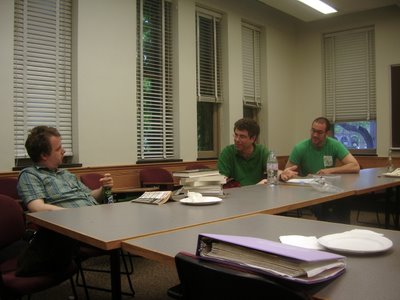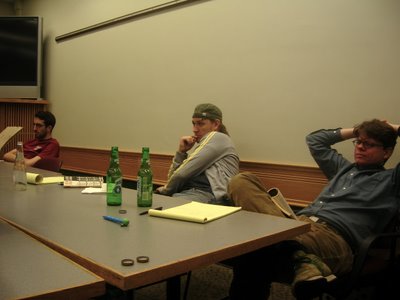

Tonight the workshop met for the last time this academic year. We discussed the last two chapters of Sense and Sensibilia and what we might read in the fall.
I will post a synopsis of our discussion of Austin shortly.
We decided on four possible books for the fall:
1. John Campbell, Reference and Consciousness
2. Fiona Cowie, What's Within: Nativism Reconsidered
3. David Chalmers, The Conscious Mind
4. David Velleman, Self to Self
-------------------------------------------------------------
Sense and Sensibilia, Chapters X and XI
David F. was on point tonight for the workshop. He got things going by asking three questions about the penultimate chapter in S&S:
- When Austin is arguing against the view that there are kinds of sentences that are incorrigible, he says that it is possible to have "complete confidence" in statements that one makes, but that the confidence is due not to the kind of sentence that is uttered, but to the "circumstances" when one makes them (114). He gives the following example of such a statement: "...if I watch for some time an animal a few feet in front of me, in a good light, if I prod it perhaps, sniff, and take note of the noises it makes, I may say, 'That's a pig'; and this too will be 'incorrigible', nothing could be produced that would show that I had made a mistake" (114). But, hold on--in what sense (if any) is it true to say, as Austin does here, that nothing could be produced that would show that I had made a mistake?
- When Austin considers Ayer's claim that "'material object' statements are as such not conclusively verifiable" (117), he argues that, in general, "statements about 'material things'" don't need to be verified. He gives as an example that a speaker who knows that he lives in Oxford cannot even count as verifying that he lives in Oxford (117-118). Fine, David said, but is this just something specific about verification? That is, would Austin's criticisms still be relevant if Ayer had said "justifiable" in place of "verifiable"?
- One of Austin's primary targets in chapter X is the idea that there is a class of sentences that have some kind of incorrigible status. These sentences, if they existed, might serve as a foundation for the rest of our knowledge (105). David asked whether, granting that there isn't a special class of sentences that have a special incorrigible status, is there still room for a foundation for knowledge? Maybe not an incorrigible foundation, but a foundation nevertheless? (David then quoted W. Sellars to the effect that without an empirical foundation our knowledge would be classed with rumors and hoaxes as support for the idea that we may want a foundation even if it isn't an incorrigible one.)
We discussed these questions in reverse order.
I said, in response to David's third question, that I thought Austin would be equally suspicious of a non-incorrigible foundationalism of the kind David attributed to Sellars. Why should there be a special kind of knowledge (observational knowledge) that is what all of our other knowledge rests on? Consider Austin's Oxford example (117-118): does my knowing that I live in Oxford "rest" on some foundation of observational knowledge? I think Austin would say that it is incorrect to say that it does. David suggested that self-knowledge (that one is in pain, for example) might also be a case where the idea of the knowledge as resting on an observational foundation seems out of place.
(There was some discussion at this point of McDowell's epistemological views, and whether he counts as a foundationalist (in some sense or other). I don't think we reached any substantial conclusions about that topic.)
Jason asserted, in response to the second question, that Austin has scored only a minor victory over Ayer by showing that not all statements must be "verified" to count as knowledge. He hasn't established the more interesting result that not all statements about 'material things' need to be
justified if they're to count as knowledge. Jason went on to say that whenever we know something (like that we live in Oxford, say), we know it in some particular way (or ways). That way (or those ways) constitute a justification for what we know.
Will in particular argued against this point, claiming some inspiration from McDowell, but it seemed that by the end of the discussion Jason's assertion about there always being a way in which we know something hadn't been knocked down.
We then spent some time trying to figure out what Austin could have meant by saying that "nothing could be produced to show that [he] had made a mistake" in the situation he describes with the pig. We thought that actually it was pretty easy to come up with ways in which things could be produced to show that Austin had made a mistake even when he's been watching the animal a few feet in front of him, prodding it, sniffing it, and so on. Maybe it's a warthog in a pig-costume, for example. It would certainly be true that nothing could be produced to show that Austin had made a mistake if he
knows that the animal he's looking at is a pig. But he doesn't give that as his reason for saying that nothing could show he had made a mistake. So we wondered about what was going on here, and we suggested some possible things Austin might mean by "nothing could be produced that would show I had made a mistake". But the most plausible was pretty underwhelming: we thought maybe Austin just meant "could" in some practical sense of "could", where for most practical purposes, you couldn't convince me that the thing in front of me wasn't a pig. Only in odd philosophical situations would that be possible, and this isn't such a case.
We then wrapped up the discussion of the Austin and concluded the workshop for this academic year. Huzzah.





